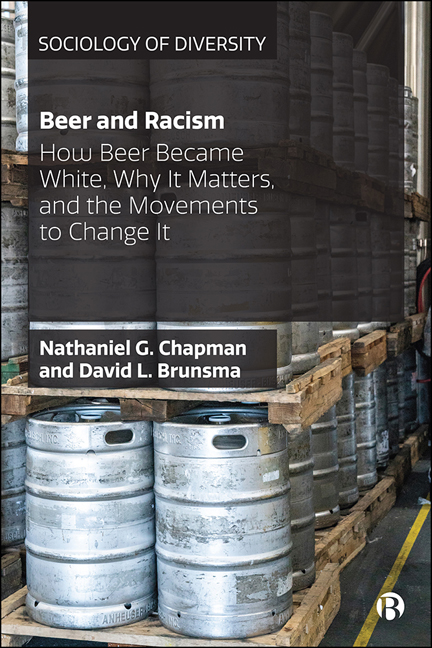Book contents
- Frontmatter
- Dedication
- Contents
- About the Authors
- Acknowledgments
- Foreword
- Series Editor Preface
- 1 Brewing Up Race
- 2 Racism, Brewing, and Drinking in US History
- 3 The Making of the (White) Craft Beer Industry
- 4 The Paths to Becoming a Craft Brewer and Craft Beer Consumer
- 5 Exposure, Marketing, and Access: Malt Liquor and the Racialization of Taste
- 6 Gentrification and the Making of Craft Beer White Spaces
- 7 #WeAreCraftBeer: Contemporary Movements to Change the Whiteness of Craft Beer
- Appendix A Respondents to the Semi-Structured Interviews
- Appendix B Interview Protocol
- References
- Index
Series Editor Preface
Published online by Cambridge University Press: 25 February 2021
- Frontmatter
- Dedication
- Contents
- About the Authors
- Acknowledgments
- Foreword
- Series Editor Preface
- 1 Brewing Up Race
- 2 Racism, Brewing, and Drinking in US History
- 3 The Making of the (White) Craft Beer Industry
- 4 The Paths to Becoming a Craft Brewer and Craft Beer Consumer
- 5 Exposure, Marketing, and Access: Malt Liquor and the Racialization of Taste
- 6 Gentrification and the Making of Craft Beer White Spaces
- 7 #WeAreCraftBeer: Contemporary Movements to Change the Whiteness of Craft Beer
- Appendix A Respondents to the Semi-Structured Interviews
- Appendix B Interview Protocol
- References
- Index
Summary
As I write this, cities across the US are lined with protesters seeking justice for what has continued to be a never-ending attack against blacks. This anti-blackness violence is not new, nor is it just about the murder of George Floyd by Minneapolis police officer Derek Chauvin, who placed his knee on Floyd's neck, while Floyd was handcuffed and lying face down on a city street, for 8 minutes and 42 seconds. Nor is it just about the murder of Breonna Taylor, who was gunned down while sleeping in her apartment by plainclothes police officers on the southside of Louisville, KY. Rather, what we are witnessing is yet another moment in history where people are fed up. It is not enough to sit idly by and demand (hope for) justice; peaceful protests and the calls for civility are often used by whites (and their supporters) to quell public unrest— an acknowledgment that some lives are worth more than others. Racism and anti-blackness are real in America, and not figments of our imagination. Nor are they relegated to one political party over another, unique to one institution over another, or just the seeds of a few bad apples. Racism and anti-blackness are systemic. As sociologist Eduardo Bonilla-Silva has argued, we live in a racialized social system in which privileges are afforded to some over others, and in which our very institutions are racialized (and gendered, etc.) and work to maintain the current racial order. Yet, the world is not that simple, still. We are governed by intersecting and global systems of oppression. Late political scientist Cedric Robinson, expanding on the profound works of sociologist Oliver Cromwell Cox, warned us of the dangers of an evolving system of oppression that would be dependent on violence, racism, imperialism, and so forth. Racial capitalism is saturated in our society and our culture; it informs us of who belongs and who might tag along so long as they do not disrupt the current social and racial order. Some would argue that the COVID-19 pandemic is a result of racial capitalism. Certainly, we have clear data that the disease has overwhelmingly affected folx of color more so, and in ways that differ from their white counterparts.
- Type
- Chapter
- Information
- Beer and RacismHow Beer Became White, Why It Matters, and the Movements to Change It, pp. xv - xviPublisher: Bristol University PressPrint publication year: 2020



